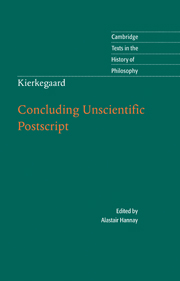Book contents
- Frontmatter
- Contents
- Introduction
- Chronology
- Further reading
- Note on the translation
- CONCLUDING UNSCIENTIFIC POSTSCRIPT TO THE PHILOSOPHICAL CRUMBS
- Preface
- Contents
- Introduction
- Part One The objective problem of Christianity's truth
- 1 The historical view
- 2 The speculative view
- Part Two The subjective problem. The subject's relation to the truth of Christianity, or what it is to become a Christian
- 5 Conclusion
- Appendix: Understanding with the reader
- A first and last declaration by S. Kierkegaard
- Index
- Cambridge Texts in the History of Philosophy
1 - The historical view
Published online by Cambridge University Press: 26 February 2010
- Frontmatter
- Contents
- Introduction
- Chronology
- Further reading
- Note on the translation
- CONCLUDING UNSCIENTIFIC POSTSCRIPT TO THE PHILOSOPHICAL CRUMBS
- Preface
- Contents
- Introduction
- Part One The objective problem of Christianity's truth
- 1 The historical view
- 2 The speculative view
- Part Two The subjective problem. The subject's relation to the truth of Christianity, or what it is to become a Christian
- 5 Conclusion
- Appendix: Understanding with the reader
- A first and last declaration by S. Kierkegaard
- Index
- Cambridge Texts in the History of Philosophy
Summary
If Christianity is looked on as a historical document, the important thing is to obtain completely reliable reports of what the Christian doctrine really is. Here, if the investigating subject were infinitely interested in his relation to this truth, he would despair straight away, because nothing is easier to see than that with regard to history the greatest certainty is after all only an approximation, and an approximation is too little to base his happiness on, and incongruent to such a degree with an eternal happiness that no ready solution can emerge. Since, however, the inquiring subject is interested only historically (whether, as a believer, he is also infinitely interested in the truth of Christianity, in which case his whole effort is liable to embroil him in a fair number of contradictions, or whether, lacking any impassioned negative decision as an unbeliever, he stays outside), he sets to work on the enormous studies to which he himself makes new contributions right up until his seventieth year. Just two weeks before his death he is looking forward to a new publication that is said to shed light on one whole side of the debate. A state of mind as objective as that – if the contrast is not an epigram on it – is an epigram on the infinitely interested subject's state of unrest, insisting as he does on having a question like that, concerning the decision on his eternal happiness, answered and yet not daring in each case, and at any price, to give up his infinite interest until the very last moment.
- Type
- Chapter
- Information
- Kierkegaard: Concluding Unscientific Postscript , pp. 21 - 43Publisher: Cambridge University PressPrint publication year: 2009

